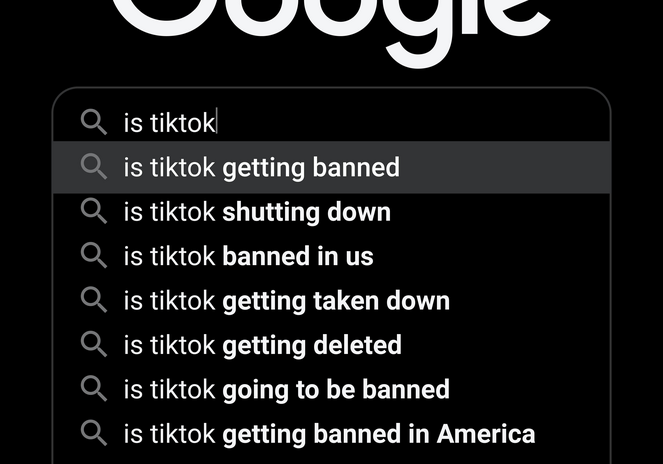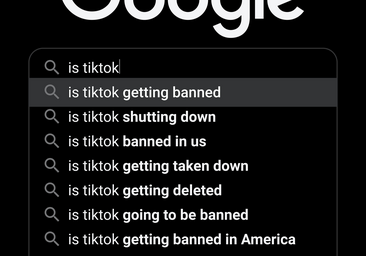Over the summer, my internship and virtual summer courses kept me from falling down a TikTok hole for hours at a time. But recently, a strong need to procrastinate my homework and check out content creators from my school, finally got me to download the app.
After a few weeks of digging deep into my For You page, I learned that TikTok was being banned by the Trump administration, citing their Chinese parent company – ByteDance – as a threat to U.S national security. Currently, the ban has been temporarily stopped by Judge Carl Nichols’s preliminary injunction, which allows Apple and Google to keep TikTok available for download in their app stores.
This, in turn, slows down the progression of the rest of the ban which plans to shut down all of TikTok’s U.S operation. Although this juggernaut platform has been temporarily saved from execution, this doesn’t keep it off the chopping block for the foreseeable future. The outcome of multiple bids from U.S companies to buy the app, the upcoming presidential election, and the progression of the COVID-19 pandemic can affect TikTok’s future and its two billion users. But all politics (and pandemics) aside, how would a complete TikTok shutdown affect the larger entertainment industry that it’s a part of?

Let’s start with the people most immediately affected, TikTok creators. When I downloaded TikTok, one of the things that surprised me most was the level of minority representation on the app. I had previously thought it was just white, middle-class teens who liked to post videos about dance trends. Don’t get me wrong, there is nothing wrong about dance trend videos. But the level of visibility on TikTok for minority groups that had been ignored by mainstream Hollywood entertainment was impressive.
An example of this type of visibility for minority groups is the Muslim community on TikTok. As someone who has never been introduced to Muslim culture in my personal life, I was surprised to see it on my For You page. Just by following a couple of Muslim TikTok creators, I have been able to learn a lot about Muslim humor and how its culture differs all around the world. This isn’t just happening on my For You Page either. According to an LA Times article, “Muslim creators, and many others, have rapidly built up a dedicated global audience, thanks to TikTok algorithm and its advanced system of discovery.”
Through TikTok’s “For You Page,” audiences across world can discover quality content regardless of who’s making it. Without a platform like TikTok, users from underrepresented minority groups may lose their voice, or all forms of authentic mainstream representation for their communities. Advertisers will move to other platforms and dancing teens will see their stories told in other forms of media, but underrepresented communities may never find another platform that’s as accessible or gives them a loud enough voice to break into the mainstream.
TikTok’s model of analyzing user data to create a page that is tailored to their tastes is what made the app both famous and potentially banned. But no matter which side of the issue you stand on, there is no doubt that a TikTok ban sets a huge precedent for how the U.S government deals with social media data mining. The app is just one example of a technology commodity in the U.S / China trade war, according to Variety. But it’s so much more than that. If TikTok can get banned in the U.S, how much farther can the government take this type of legislation? Could congress or the president be able to ban parts of Facebook or Snapchat features that track what you do online or where you go?
Some would argue that these features are part of what makes TikTok able to voice their personal opinions and connect with people in their real lives. But others would call it a breach of privacy. Either way, the TikTok ban gives the federal government the potential power to shut down conversations completely, as well as take away our freedom to choose whether or not to engage with social media at all.
Politics and ideological beliefs aside, if the government has the power to decide what we watch, then entertainment studios as well as renegade startups will have to seriously reconsider censoring their content to stay in business. Once this happens, the customization and curation of content to fit unique users will likely be a thing of the past, and we will revert to a wider and less diverse “one size fits all demographics” approach.

Other entertainment companies have quickly tried to emulate this model. Instagram came out with Reels and YouTube will soon be releasing a curated short video app called Shorts. Even TikTok’s top creators are now migrating to an app called Triller and have started creating content there. But if everybody is doing the same thing to get users to log on, how can the variety and originality be replaced. Personally, I don’t think it’s in any of these copycat apps, or even in a “new” app that’s claiming to be different because it allows users to upload two-minute videos instead of the standard one minute.
No, the next big thing to fill the space that TikTok leaves behind will be entirely different. It will be a fresh new take on keeping people creative and connected that will reinvent the social media space as much as TikTok did. That may not come for a while, but in the meantime, we can keep scrolling on our For You pages until the government decides whether or not to shut the original down. Let’s just hope the “next big thing” doesn’t get banned either.
Want to keep up with HCBU? Make sure to like us on Facebook, follow us on Instagram, check out our Pinterest board, and read our latest Tweets!


